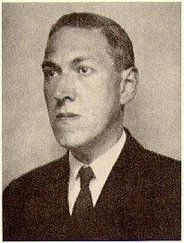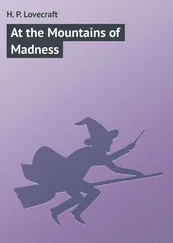The trees budded prematurely around Nahum’s, and at night they swayed ominously in the wind. Nahum’s second son Thaddeus, a lad of fifteen, swore that they swayed also when there was no wind; but even the gossips would not credit this. Certainly, however, restlessness was in the air. The entire Gardner family developed the habit of stealthy listening, though not for any sound which they could consciously name. The listening was, indeed, rather a product of moments when consciousness seemed half to slip away. Unfortunately such moments increased week by week, till it became common speech that “something was wrong with all Nahum’s folks”. When the early saxifrage came out it had another strange colour; not quite like that of the skunk-cabbage, but plainly related and equally unknown to anyone who saw it. Nahum took some blossoms to Arkham and shewed them to the editor of the Gazette, but that dignitary did no more than write a humorous article about them, in which the dark fears of rustics were held up to polite ridicule. It was a mistake of Nahum’s to tell a stolid city man about the way the great, overgrown mourning-cloak butterflies behaved in connexion with these saxifrages.
April brought a kind of madness to the country folk, and began that disuse of the road past Nahum’s which led to its ultimate abandonment. It was the vegetation. All the orchard trees blossomed forth in strange colours, and through the stony soil of the yard and adjacent pasturage there sprang up a bizarre growth which only a botanist could connect with the proper flora of the region. No sane wholesome colours were anywhere to be seen except in the green grass and leafage; but everywhere those hectic and prismatic variants of some diseased, underlying primary tone without a place among the known tints of earth. The Dutchman’s breeches became a thing of sinister menace, and the bloodroots grew insolent in their chromatic perversion. Ammi and the Gardners thought that most of the colours had a sort of haunting familiarity, and decided that they reminded one of the brittle globule in the meteor. Nahum ploughed and sowed the ten-acre pasture and the upland lot, but did nothing with the land around the house. He knew it would be of no use, and hoped that the summer’s strange growths would draw all the poison from the soil. He was prepared for almost anything now, and had grown used to the sense of something near him waiting to be heard. The shunning of his house by neighbours told on him, of course; but it told on his wife more. The boys were better off, being at school each day; but they could not help being frightened by the gossip. Thaddeus, an especially sensitive youth, suffered the most.
In May the insects came, and Nahum’s place became a nightmare of buzzing and crawling. Most of the creatures seemed not quite usual in their aspects and motions, and their nocturnal habits contradicted all former experience. The Gardners took to watching at night—watching in all directions at random for something… they could not tell what. It was then that they all owned that Thaddeus had been right about the trees. Mrs. Gardner was the next to see it from the window as she watched the swollen boughs of a maple against a moonlit sky. The boughs surely moved, and there was no wind. It must be the sap. Strangeness had come into everything growing now. Yet it was none of Nahum’s family at all who made the next discovery. Familiarity had dulled them, and what they could not see was glimpsed by a timid windmill salesman from Bolton who drove by one night in ignorance of the country legends. What he told in Arkham was given a short paragraph in the Gazette ; and it was there that all the farmers, Nahum included, saw it first. The night had been dark and the buggy-lamps faint, but around a farm in the valley which everyone knew from the account must be Nahum’s the darkness had been less thick. A dim though distinct luminosity seemed to inhere in all the vegetation, grass, leaves, and blossoms alike, while at one moment a detached piece of the phosphorescence appeared to stir furtively in the yard near the barn.
The grass had so far seemed untouched, and the cows were freely pastured in the lot near the house, but toward the end of May the milk began to be bad. Then Nahum had the cows driven to the uplands, after which the trouble ceased. Not long after this the change in grass and leaves became apparent to the eye. All the verdure was going grey, and was developing a highly singular quality of brittleness. Ammi was now the only person who ever visited the place, and his visits were becoming fewer and fewer. When school closed the Gardners were virtually cut off from the world, and sometimes let Ammi do their errands in town. They were failing curiously both physically and mentally, and no one was surprised when the news of Mrs. Gardner’s madness stole around.
It happened in June, about the anniversary of the meteor’s fall, and the poor woman screamed about things in the air which she could not describe. In her raving there was not a single specific noun, but only verbs and pronouns. Things moved and changed and fluttered, and ears tingled to impulses which were not wholly sounds. Something was taken away—she was being drained of something—something was fastening itself on her that ought not to be—someone must make it keep off—nothing was ever still in the night—the walls and windows shifted. Nahum did not send her to the county asylum, but let her wander about the house as long as she was harmless to herself and others. Even when her expression changed he did nothing. But when the boys grew afraid of her, and Thaddeus nearly fainted at the way she made faces at him, he decided to keep her locked in the attic. By July she had ceased to speak and crawled on all fours, and before that month was over Nahum got the mad notion that she was slightly luminous in the dark, as he now clearly saw was the case with the nearby vegetation.
It was a little before this that the horses had stampeded. Something had aroused them in the night, and their neighing and kicking in their stalls had been terrible. There seemed virtually nothing to do to calm them, and when Nahum opened the stable door they all bolted out like frightened woodland deer. It took a week to track all four, and when found they were seen to be quite useless and unmanageable. Something had snapped in their brains, and each one had to be shot for its own good. Nahum borrowed a horse from Ammi for his haying, but found it would not approach the barn. It shied, balked, and whinnied, and in the end he could do nothing but drive it into the yard while the men used their own strength to get the heavy wagon near enough the hayloft for convenient pitching. And all the while the vegetation was turning grey and brittle. Even the flowers whose hues had been so strange were greying now, and the fruit was coming out grey and dwarfed and tasteless. The asters and goldenrod bloomed grey and distorted, and the roses and zinneas and hollyhocks in the front yard were such blasphemous-looking things that Nahum’s oldest boy Zenas cut them down. The strangely puffed insects died about that time, even the bees that had left their hives and taken to the woods.
By September all the vegetation was fast crumbling to a greyish powder, and Nahum feared that the trees would die before the poison was out of the soil. His wife now had spells of terrific screaming, and he and the boys were in a constant state of nervous tension. They shunned people now, and when school opened the boys did not go. But it was Ammi, on one of his rare visits, who first realised that the well water was no longer good. It had an evil taste that was not exactly foetid nor exactly salty, and Ammi advised his friend to dig another well on higher ground to use till the soil was good again. Nahum, however, ignored the warning, for he had by that time become calloused to strange and unpleasant things. He and the boys continued to use the tainted supply, drinking it as listlessly and mechanically as they ate their meagre and ill-cooked meals and did their thankless and monotonous chores through the aimless days. There was something of stolid resignation about them all, as if they walked half in another world between lines of nameless guards to a certain and familiar doom.
Читать дальше












